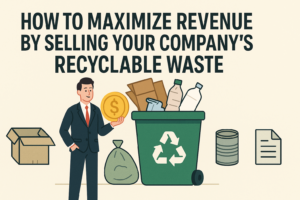Metal recycling is an essential process that every city and municipality should consider. Not only does it help reduce waste and conserve resources, but it can also generate revenue for local governments. However, many municipal authorities are unaware of the benefits of metal recycling or how to implement scrap recycling programs effectively. In this blog post, we will explore the various applications of municipal scrap, which departments can benefit from metal recycling programs, and provide examples of successful initiatives implemented by cities around the world. So let’s dive in!

Applications for Municipal Scrap
Municipal scrap refers to any metal waste generated by cities and municipalities, including discarded appliances, vehicles, construction materials, and more. This scrap can be recycled and repurposed in a variety of ways.
One application for municipal scrap is the creation of new products. Recycled metal can be used to manufacture everything from car parts to building materials. By utilizing this resource instead of mining new metals, we can reduce our environmental impact while also conserving natural resources.
Another use for municipal scrap is generating revenue through recycling programs. Cities can set up collection centers or partner with private companies to collect and recycle metal waste. The profits from these initiatives can then be reinvested into community projects or used to fund city services.
Recycling municipal scrap also helps divert waste from landfills, reducing the amount of space needed for garbage disposal. In turn, this reduces greenhouse gas emissions that contribute to climate change.
There are numerous applications for municipal scrap that make it a valuable resource for cities and municipalities alike.
What Departments Can Benefit?
Municipal scrap recycling can benefit a wide range of government departments. For instance, the Department of Public Works and Utilities often deals with large amounts of metal waste from construction projects or outdated infrastructure. Recycling such scrap materials not only reduces landfill waste but also generates revenue for the city.
Police and Fire Departments may also have metal equipment that no longer serves its purpose, such as old vehicles or damaged equipment. These items can be recycled to create new products while providing additional funding for public safety initiatives.
Even small-scale municipal offices generate metal waste through everyday operations like filing, printing, and packaging. By participating in scrap recycling programs, these departments can reduce their environmental impact while supporting sustainable practices on a local level.
By implementing a comprehensive recycling program for municipal scrap materials across all departments within cities and municipalities, we can achieve significant benefits for both our environment and economy.
Examples of City Scrap
Cities and municipalities generate a large amount of scrap metal from various sources. One common source is old infrastructure that needs to be replaced, such as bridges, streetlights or water pipes. These materials can often be recycled and repurposed for other projects.

Another example of city scrap is discarded appliances and electronics. As technology continues to advance, older devices become obsolete and are often thrown away. However, these items contain valuable metals like copper, aluminum and steel that can be reused in manufacturing new products.
Additionally, construction sites within cities produce significant amounts of metal waste that can be salvaged for recycling purposes. This includes leftover building materials like pipes, wires and beams.
Some cities have implemented successful programs for collecting recyclable metal waste from residents as well. For example, the City of San Francisco has a curbside recycling program that accepts all types of metal cans and containers.
There are numerous examples of city scrap that can be recycled through municipal government scrap recycling programs across the country. By implementing effective strategies for managing this material waste stream responsibly through recycling efforts at every level possible help promote sustainable practices while reducing greenhouse gas emissions associated with landfills over time!
Contact Us
We hope this article has given you a better understanding of the benefits and applications of metal recycling for cities and municipalities. By implementing scrap recycling programs, government departments can not only save money but also contribute to environmental sustainability.
If your city or municipality is interested in starting a metal recycling program, don’t hesitate to contact us. Our team at Star Recycling specializes in providing comprehensive recycling solutions tailored to meet your specific needs. Let’s work together towards a cleaner and greener future!




